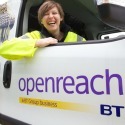Networks business will become a legally separate entity within BT Group, with its own board and budget, following deal with regulator Ofcom.

BT has finally reached an agreement with regulatory authority Ofcom on the "legal separation" of its Openreach infrastructure business following months of wrangling between the two organizations.
In official statements today, BT Group plc (NYSE: BT; London: BTA) and Ofcom said that Openreach would become a legally separate company within BT Group with its own board, strategy, budget and branding.
The move is broadly designed to ensure that BT cannot use Openreach ownership to gain an advantage over broadband rivals that rely on its networks, although it seems unlikely to completely satisfy several of BT's largest competitors, which ultimately would like to see Openreach spun off as an entirely separate company.
Under the deal hammered out today, Clive Selley, Openreach's CEO, will be accountable to the Openreach board and have only "secondary accountability" to Gavin Patterson, BT Group's CEO. While Patterson will be able to veto the appointment of a new Openreach CEO, he will have to notify Ofcom first.
The deal will see about 32,000 BT employees, representing around a third of the entire workforce, transfer directly to Openreach.
BT said that move would be one of the largest such staff transfers in UK corporate history and would take place once proper pension arrangements were put in place for those employees.
It also said that Openreach would be free to explore "alternative co-investment models in private with third parties."
Companies such as mobile operator Vodafone Group plc (NYSE: VOD), which uses BT's infrastructure to provide services, had previously hinted at the possibility of investing in Openreach were it to become a distinct company outside BT Group. (See Vodafone CEO: I Want a Piece of Openreach.)
The agreement with Ofcom means the regulator will not have to impose its own form of legal separation on BT, as it had previously threatened, and may come as a relief to shareholders fearing more stringent regulation.
BT's share price was trading up 4.2% on the London stock exchange Friday morning, at about £3.44.
The Ofcom deal also follows a period in which BT's efforts to appoint "independent" board members at Openreach -- as a step toward legal separation -- have met with outright criticism from the regulator. (See BT Bulks Up Openreach Board to Appease Ofcom.)
Indeed, Ofcom had previously expressed disappointment with BT's overall efforts to legally separate and suggested that it might eventually need to intervene in the process.
For more fixed broadband market coverage and insights, check out our dedicated broadband content channel here on Light Reading.
What remains to be seen is how legal separation will work in practice and whether it will mollify BT's rivals in the months ahead.
At the time of writing, Sky and TalkTalk , the UK's second- and fourth-biggest broadband retailers, appeared to be the only companies to have responded officially to the plans.
"This is a welcome step that we have long called for on behalf of our customers," said a Sky spokesperson in an email. "A more independent Openreach is a step toward delivering better service to customers and the investment that the UK needs."
A statement from TalkTalk CEO Dido Harding echoed those remarks. "We welcome the agreement to create a legally separate Openreach," said Harding. "The new company will be better placed to deliver the improved investment and service that consumers and businesses deserve."
Both organizations, however, implied they will reserve full judgment on legal separation until they have seen evidence of its implementation, and neither is likely to be entirely happy, even if they do welcome the move as a step in the right direction. (See Only BT's Dismemberment Will Sate Rivals.)
Legal separation essentially goes a bit further than the "functional separation" that brought Openreach into existence in the first place back in 2006.
That move was designed to improve transparency and ensure that BT could not sell wholesale services to its rivals at a higher price than it did to its own retail business.
As a legally separate entity, Openreach should find it even harder to put rivals at a disadvantage -- something BT has always insisted it does not do -- and yet Openreach will still be a part of BT Group.
The fact that just one of the UK's broadband retailers owns almost all of the country's fixed-line telecom infrastructure -- some of which has been rolled out at the taxpayer's expense -- is the real sticking point for many of BT's critics.
— Iain Morris, 

 , News Editor, Light Reading
, News Editor, Light Reading
Read more about:
EuropeAbout the Author(s)
You May Also Like











